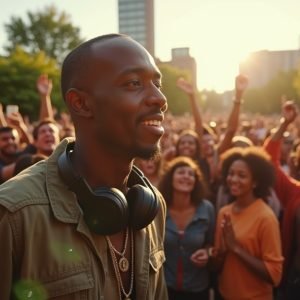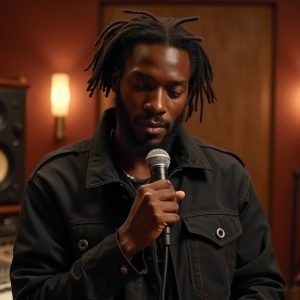Bob Vylan Denies Antisemitism Claims Following Glastonbury Set Amidst Police Probe and Visa Revocation
The acclaimed rap-punk duo Bob Vylan has strongly refuted allegations of antisemitism that have surfaced following their recent performance at the Glastonbury Festival. The controversy stems from comments made during their set, which have led to a police investigation and significant backlash.
Glastonbury Controversy and Chants
During their performance at the renowned music festival, frontman Bob Vylan led the crowd in chants of “Death to the IDF.” These actions have been interpreted by many as antisemitic, sparking widespread criticism and prompting an official response from authorities. The band, however, has pushed back against these accusations, asserting that they are being unfairly targeted for expressing their views on the ongoing conflict in Gaza.
Band’s Defense and Allegations of Targeting
In a statement addressing the allegations, Bob Vylan asserted that the band is being “targeted for speaking up” about the war in Gaza. The duo maintains that their comments were a response to the broader political situation and not an expression of hatred towards any religious or ethnic group. They suggest that their vocal stance on the conflict has made them a target for criticism and censure.
Official Reactions and Investigations
The events at Glastonbury have not gone unnoticed by official bodies. Local police have launched an investigation into the chants led by the frontman. The BBC, a prominent broadcaster and a significant presence at the festival, has also drawn criticism for their coverage or perceived lack thereof. Furthermore, the implications of the chants have reached international shores, with U.S. authorities taking a stern stance by revoking the musicians’ visas. This action severely impacts the duo’s ability to tour and perform in the United States, highlighting the gravity with which the incident is being treated.
Wider Implications for Music and Politics
The incident involving Bob Vylan at Glastonbury underscores the increasingly complex intersection of music, political activism, and public perception. The festival, known for its diverse lineup and often politically charged atmosphere, has once again become a stage for significant social commentary. The rap-punk genre, with its history of rebellion and outspokenness, frequently tackles contentious issues, and this latest event places Bob Vylan at the center of a debate about the boundaries of free speech and the responsibilities of artists performing on global platforms.
The swift response from law enforcement and international authorities suggests a growing sensitivity to rhetoric surrounding geopolitical conflicts, particularly those involving deeply entrenched historical and political dimensions. The band’s defense, which frames their actions as a consequence of speaking out against perceived injustices, introduces another layer to the narrative, inviting discussions about the intent behind their words and the impact they have had.
As the investigation continues and the debate around the band’s comments rages on, the future implications for Bob Vylan’s career, both domestically and internationally, remain uncertain. Their stance on the war in Gaza, coupled with the severe repercussions from U.S. immigration authorities, sets a precedent for how politically charged statements at major cultural events will be handled moving forward. The hip hop and punk music scenes, often at the forefront of social and political discourse, will undoubtedly be watching this situation closely, as it touches upon fundamental questions about artistic expression and accountability in the modern era of news and global connectivity.

























